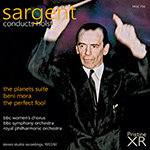
This album is included in the following sets:
This set contains the following albums:
- Producer's Note
- Full Track Listing
- Cover Art
When Sir Malcolm Sargent entered Kingsway Hall in August 1957 to record The Planets with the BBC Symphony Orchestra, the world of recorded sound was on the cusp of a revolution. Stereo, still in its infancy, was about to transform the listener’s experience — and few works were better suited to demonstrate its power than Holst’s cosmic suite. Sargent, ever the showman yet always a craftsman, seized the opportunity with characteristic assurance. The result, coupled here with the exotic Beni Mora from the same sessions, remains one of the most thrilling sonic experiences of its time: majestic in scope, refined in detail, and recorded with a splendour that made reviewers’ jaws drop.
Trevor Harvey’s Gramophone notice for the mono issue, published in September 1958, was already glowing. Comparing Sargent’s new HMV recording to his earlier Decca version and to Boult’s, he found the distinctions too fine to call. “Swings and roundabouts it is,” he wrote — “two magnificent readings, in fact.” Yet Harvey was bowled over by the engineering: “This is a superb performance, extremely well recorded … the new HMV has richness into the bargain, as well as a capability of climax that is magnificent. The surface is perfect … and such things as the double-basses in Saturn are marvellously good.” For all his admiration, he lamented that EMI had chosen to duplicate Sargent’s Decca effort rather than broaden the Holst catalogue — but his admiration for the performance itself was unqualified.
Then came the stereo release a few months later, and Harvey was even more effusive. “It is the most vivid bit of stereo recording I have yet heard,” he declared in January 1959. The Planets, he noted, was precisely the kind of large-scale score in which stereo “really comes into its own.” He described with near-scientific delight how the strings stretched from left to right, the harps gleamed from the left-hand side, and the bells in Saturn rang out with pinpoint precision. What impressed him most, though, was not the gimmickry of spatial separation, but the realism — the way stereo approximated, as he put it, “what Holst had in mind.” It was an astonishing achievement for 1957 technology, and a perfect marriage of musical authority and technical innovation.
Sargent’s interpretation, meanwhile, had mellowed slightly since his 1954 Decca reading. The sweep and vitality remained, but there was now a greater sense of architectural control — a stately grandeur in Mars, a poised lyricism in Venus, and an unhurried serenity in Neptune, with the BBC Women’s Chorus fading magically into silence. The orchestra, with whom Sargent had a long and occasionally tempestuous relationship, played with brilliance and commitment. As Robert Layton later observed in Gramophone (January 1972), the BBC players brought “ample vigour and spirit” to a performance that had “withstood the test of time extremely well.” He praised the poetry of Venus, the mercurial sparkle of Mercury, and concluded that Sargent’s stereo Planets remained “highly competitive” even against newer Boult and Haitink versions.
Beni Mora, recorded during the same Kingsway sessions, shows another side of Holst’s imagination — the fascination with the East that permeated so much early 20th-century English music. Based on impressions Holst gathered during a visit to Algeria, it unfolds as a vivid tone-painting of rhythmic dance and languorous melody. Sargent relishes its sensuality, shaping the hypnotic final movement — built around an endlessly repeating flute figure — with an ear for its trance-like modernity. It is music that feels both exotic and strangely minimalist, decades ahead of its time.
By contrast, The Perfect Fool, recorded four years later at Abbey Road with the Royal Philharmonic Orchestra, inhabits a very different world. Premiered in 1923, this brief ballet-suite is Holst at his most mischievous — a sparkling parody of operatic convention and a riot of orchestral colour. The suite’s three dances — of Spirits of Earth, Water, and Fire — gave Holst a chance to unleash his gift for vivid scoring: trombone glissandi, glittering percussion, and bold, brass-driven climaxes. Sargent, ever alert to theatrical flair, draws playing of tremendous panache from the RPO, his tempi taut, his phrasing crisp, his humour perfectly judged.
Taken together, these recordings form a miniature panorama of Holst’s world: the visionary (The Planets), the impressionist (Beni Mora), and the ironist (The Perfect Fool). They also chart a moment of transformation in the history of recording, when stereo ceased to be a novelty and became an expressive tool in its own right. Sixty-eight years later, Sargent’s Planets still glows with what Layton called “spaciousness and depth” — qualities that time and technological change have not dimmed. Heard anew in Pristine’s transfer, this remains one of the great Holst recordings: authoritative, expansive, and, in every sense, star-studded.
SARGENT conducts Holst
HOLST The Planets Suite, Op. 32
1. 1. Mars, the Bringer of War (6:58)
2. 2. Venus, the Bringer of Peace (9:11)
3. 3. Mercury, the Winged Messenger (3:31)
4. 4. Jupiter, the Bringer of Jollity (7:45)
5. 5. Saturn, the Bringer of Old Age (9:36)
6. 6. Uranus, the Magician (6:02)
7. 7. Neptune, the Mystic** (7:18)
HOLST Beni Mora, Op. 29, No. 1
8. 1. First Dance (5:24)
9. 2. Second Dance (2:55)
10. 3. Finale: 'In the Street of the Ouled Näils' (6:03)
HOLST The Perfect Fool, Op. 39*
11. 1. Dance of Spirits of Earth (4:39)
12. 2. Dance of Spirits of Water (2:30)
13. 3. Dance of Spirits of Fire (3:11)
BBC Symphony Orchestra & **Women's Chorus
*Royal Philharmonic Orchestra
conducted by Sir Malcolm Sargent
XR remastering by Andrew Rose
Cover artwork based on a photograph of Sargent
The Planets Suite
recorded 12 August and 23 September 1957, Kingsway Hall, London
Beni Mora
recorded 28-29 August 1957, Kingsway Hall, London
The Perfect Fool
recorded 3 January 1961, Abbey Road Studio 1, London
Total duration: 75:03

